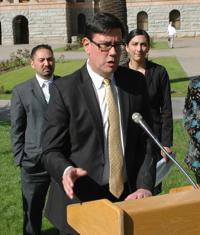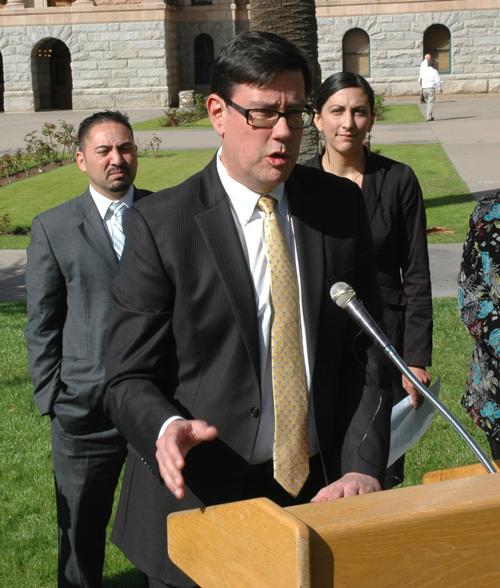PHOENIX — Senate Republicans on Tuesday approved a series of changes in state campaign finance laws that foes say eases the flow of “dark money” and makes it harder for voters to know who is trying to affect the outcome of elections.
Among the changes being made, SB 1516:
- Removes the authority of state election officials to subpoena records of candidates;
- Reduces the penalties for candidates who overspend;
- Permits candidates to divert money given to their campaigns to instead help others get elected;
- Eases requirements for disclosure on campaign advertising of the major funding sources;
- Allows unlimited spending by outside groups on social media sites with no requirement to say who is financing those efforts.
Perhaps the most notable change would eliminate existing laws that limit how much certain kinds of charities and nonprofits can spend to influence elections.
Instead, it leaves it up to the Internal Revenue Service to decide if these organizations are running afoul of federal tax laws. And if the IRS does not rule that its regulations have been violated, then the state would not seek to impose its own limits.
That means those groups would not have to disclose the true sources of funding.
Sen. Steve Farley, D-Tucson, said that makes no sense.
“This provision expressly means that anyone with a 501(c) entity in Arizona has a get-out-of-jail-free card for reporting their donors as political committees, no matter how involved in ballot measure campaigns they may be,” he said, referring to the section of the Internal Revenue Code dealing with nonprofits.
This has been an issue particularly with entities set up under 501(c)(4), a classification reserved for “social welfare” groups.
IRS code says they cannot spend more than half their money trying to elect candidates. But there is no limit on how much they can spend on lobbying, a term that under federal law includes supporting or proposing ballot measures.
As approved, SB 1516 would allow them to spend every dollar supporting or opposing initiatives, with no hint to voters of whether it really was little more than a front for certain individuals, corporations or unions.
“This will further depress voter turnout because it’s the huge wave of anonymous money that is making people feel like their vote doesn’t matter,” Farley said.
Proponents of the change have argued that forcing groups to disclose their donors limits their ability to influence elections. That includes business groups like the Arizona Chamber of Commerce and Industry. The group’s president, Glenn Hamer, has said it will “vigorously defend our right to participate in the process.”
The U.S. Supreme Court ruled in 2010 that corporations have the same right as people to donate to campaigns. That opened the door to a flood of groups that have been formed to funnel money into both candidate and ballot measures, many set up as 501(c)(4) groups that say the IRS doesn’t require disclosure of their contributors
But Farley pointed out that even Justice Anthony Kennedy, who authored that decision, said the government can still require disclosure of the sources of those funds without interfering with their right to participate in the process and regardless of IRS rules.
Sen. Adam Driggs, R-Phoenix, who is sponsoring the legislation, got Republican colleagues to reject Farley’s bid to require disclosure from groups based on their “primary purpose.” He called the phrase “ambiguous.”
Farley had no better luck convincing Republicans to accept an amendment that would have put some criminal penalties into the law.
What makes that interesting, he said, is that the language was sponsored by Michele Reagan when she was a Republican state senator from Scottsdale. In fact, Reagan made cracking down on “dark money” a key point in her 2014 campaign for secretary of state.
Yet it has been Reagan who has been pushing since her election as secretary of state in 2014 to ease disclosure requirements.
Reagan press aide Matt Roberts said Tuesday that his boss is not disavowing her former position.
“The secretary is now focused on things within her control,” he said, saying SB 1516 will give her the tools needed “to root out illegitimate political spending while protecting legitimate nonprofit groups like the Cattlemen’s Association’s right to engage in the political process.”
Roberts said that’s based on Reagan’s belief that requiring such disclosure would force “perfectly legitimate organizations” to hand over a list of their members.
Reagan also benefited in that 2014 race from outside spending, with two groups that did not disclose donors spending more than $330,000 in efforts against Terry Goddard, her Democrat foe.
Despite the 18-10 vote, Republicans did not get everything they wanted.
They had sought to alter several provisions of state law giving the Citizens Clean Elections Commission some authority to police campaign finance laws.
But the commission and its system of voluntary public financing were approved at the ballot in 1998. And the Arizona Constitution prohibits changing anything approved by voters without a three-fourths vote of both chambers, something the measure did not get.





